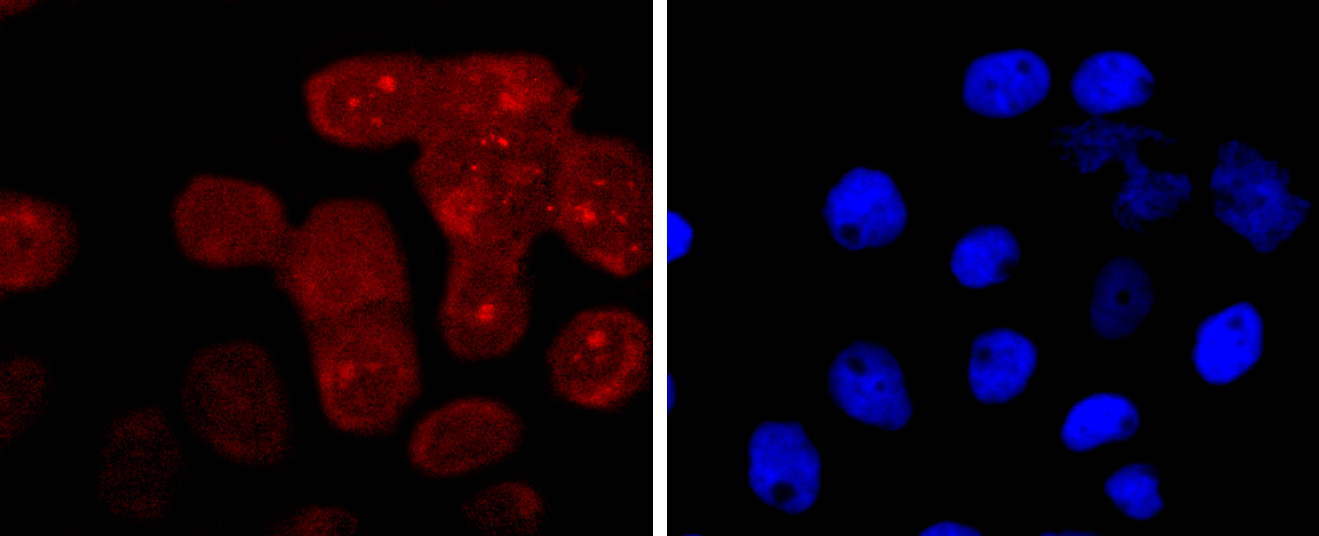Product Name :
RAGE polyclonal antibody Background :
Advanced glycosylation end products of proteins (AGEs) are nonenzymatically glycosylated proteins that are associated with a variety of conditions, including diabetes and other vascular disorders, as well as amyloidosis. These proteins regulate cellular functions via specific cell surface acceptor molecules, such as RAGE (receptor for advanced glycosylation end products). RAGE is a type 1 membrane protein that is found on the surface of endothelial cells, mononuclear phagocytes and vascular smooth muscle cells. Binding of AGEs to RAGE results in the induction of cellular oxidant stress and activation of the transcription factor NFkB. Evidence suggests that the induction of oxidant stress results in the activation of an intracellular cascade involving p21 ras and MAP kinase, which leads to activation of transcription. Product :
Rabbit IgG, 1mg/ml in PBS with 0.02% sodium azide, 50% glycerol, pH7.2 Storage&Stability :
Store at +4°C after thawing. Aliquot store at -20°C or -80°C. Avoid repeated freeze / thaw cycles. Specificity :
RAGE polyclonal antibody detects endogenous levels of RAGE protein. Immunogen :
recombinant protein Conjugate :
Unconjugated Modification :
Unmodification
RAGE polyclonal antibody Background :
Advanced glycosylation end products of proteins (AGEs) are nonenzymatically glycosylated proteins that are associated with a variety of conditions, including diabetes and other vascular disorders, as well as amyloidosis. These proteins regulate cellular functions via specific cell surface acceptor molecules, such as RAGE (receptor for advanced glycosylation end products). RAGE is a type 1 membrane protein that is found on the surface of endothelial cells, mononuclear phagocytes and vascular smooth muscle cells. Binding of AGEs to RAGE results in the induction of cellular oxidant stress and activation of the transcription factor NFkB. Evidence suggests that the induction of oxidant stress results in the activation of an intracellular cascade involving p21 ras and MAP kinase, which leads to activation of transcription. Product :
Rabbit IgG, 1mg/ml in PBS with 0.02% sodium azide, 50% glycerol, pH7.2 Storage&Stability :
Store at +4°C after thawing. Aliquot store at -20°C or -80°C. Avoid repeated freeze / thaw cycles. Specificity :
RAGE polyclonal antibody detects endogenous levels of RAGE protein. Immunogen :
recombinant protein Conjugate :
Unconjugated Modification :
Unmodification
-
 Western blot analysis of RAGE on mouse lung lysates using anti-RAGE antibody at 1/1,000 dilution.
Western blot analysis of RAGE on mouse lung lysates using anti-RAGE antibody at 1/1,000 dilution. -
 ICC staining RAGE in A431 cells (red). The nuclear counter stain is DAPI (blue). Cells were fixed in paraformaldehyde, permeabilised with 0.25% Triton X100/PBS.
ICC staining RAGE in A431 cells (red). The nuclear counter stain is DAPI (blue). Cells were fixed in paraformaldehyde, permeabilised with 0.25% Triton X100/PBS.
Bioworld Biotech only provide peptides for our antibodies and do not provide additional peptide customization services.
Price/Size :
USD 368/1mg/vial
Tips:
For phospho antibody, we provide phospho peptide(0.5mg) and non-phospho peptide(0.5mg).Describe :
Blocking peptides are peptides that bind specifically to the target antibody and block antibody binding. These peptide usually contains the epitope recognized by the antibody. Antibodies bound to the blocking peptide no longer bind to the epitope on the target protein. This mechanism is useful when non-specific binding is an issue, for example, in Western blotting (WB) and Immunohistochemistry (IHC). By comparing the staining from the blocked antibody versus the antibody alone, one can see which staining is specific; Specific binding will be absent from the western blot or IHC performed with the neutralized antibody.Formula:
Synthetic peptide was lyophilized with 100% acetonitrile and is supplied as a powder. Reconstitute with 0.1 ml DI water for a final concentration of 10 mg/ml.The purity is >90%,tested by HPLC and MS.
Storage:
The freeze-dried powder is more stable. For short time at 2-8°C. For long term storage store at -20°C.
Note :
This product is for research use only (RUO only). Not for use in diagnostic or therapeutic procedures.
 RAGE polyclonal antibody
RAGE polyclonal antibody  Datasheet
Datasheet COA
COA MSDS
MSDS SHIP
SHIP